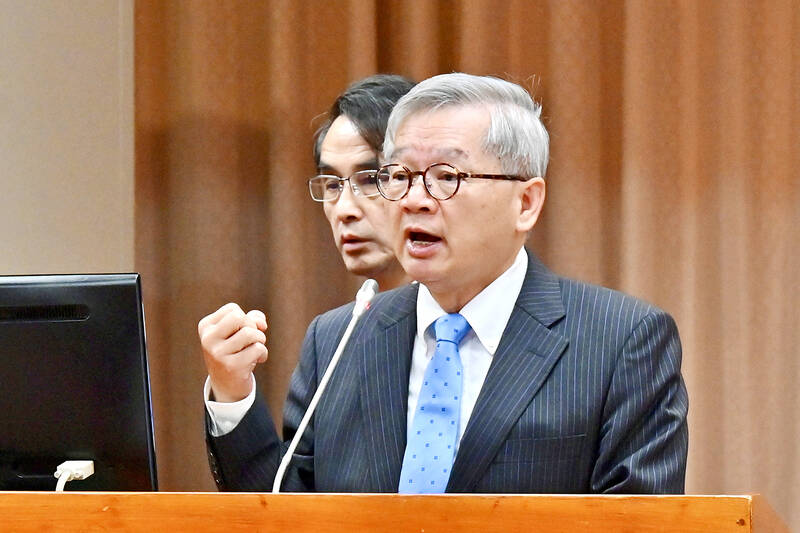Taiwan aims to send its first rocket capable of carrying a 200kg satellite into orbit by 2034, National Science and Technology Council Minister Wu Cheng-wen (吳誠文) said yesterday.
Taiwan would obtain the technologies it requires through expanded international cooperation, Taiwan Space Agency Director-General Wu Jong-shinn (吳宗信) said.
Both officials were responding to questions at a meeting of the Legislative Yuan’s Education and Culture Committee, where lawmakers were considering council funding that has been frozen for 22 items.

Photo: George Tsorng, Taipei Times
Democratic Progressive Party (DPP) Legislator Wu Pei-yi (吳沛憶) expressed concern about a NT$40 billion (US$1.34 billion) budget increase for the third phase of the National Space Technology Long-term Development Program.
Wu said he was confident and hopeful that the Legislative Yuan would support the project.
The changes to the program’s third phase include plans necessary for domestically developing rocket technology, such as establishing a launch site and a research facility, Wu said in response to questions from Taiwan People’s Party Legislator Liu Shu-pin (劉書彬).
The third phase would also aim to build a supply chain to promote industrial development in space-related sectors, Wu added.
A domestically built rocket is expected to send a 200kg satellite into orbit by 2034, Wu said.
In response to DPP Legislator Lin I-chin’s (林宜瑾) questions about international cooperation, Wu said that Taiwan’s satellite manufacturing and design capabilities are gaining recognition, bringing more interest from international partners who want to cooperate with the country.
The third phase is also expected to foster an industrial supply chain that would promote the development of the space industry, he added.

Right-wing political scientist Laura Fernandez on Sunday won Costa Rica’s presidential election by a landslide, after promising to crack down on rising violence linked to the cocaine trade. Fernandez’s nearest rival, economist Alvaro Ramos, conceded defeat as results showed the ruling party far exceeding the threshold of 40 percent needed to avoid a runoff. With 94 percent of polling stations counted, the political heir of outgoing Costa Rican President Rodrigo Chaves had captured 48.3 percent of the vote compared with Ramos’ 33.4 percent, the Supreme Electoral Tribunal said. As soon as the first results were announced, members of Fernandez’s Sovereign People’s Party

MORE RESPONSIBILITY: Draftees would be expected to fight alongside professional soldiers, likely requiring the transformation of some training brigades into combat units The armed forces are to start incorporating new conscripts into combined arms brigades this year to enhance combat readiness, the Executive Yuan’s latest policy report said. The new policy would affect Taiwanese men entering the military for their compulsory service, which was extended to one year under reforms by then-president Tsai Ing-wen (蔡英文) in 2022. The conscripts would be trained to operate machine guns, uncrewed aerial vehicles, anti-tank guided missile launchers and Stinger air defense systems, the report said, adding that the basic training would be lengthened to eight weeks. After basic training, conscripts would be sorted into infantry battalions that would take

GROWING AMBITIONS: The scale and tempo of the operations show that the Strait has become the core theater for China to expand its security interests, the report said Chinese military aircraft incursions around Taiwan have surged nearly 15-fold over the past five years, according to a report released yesterday by the Democratic Progressive Party’s (DPP) Department of China Affairs. Sorties in the Taiwan Strait were previously irregular, totaling 380 in 2020, but have since evolved into routine operations, the report showed. “This demonstrates that the Taiwan Strait has become both the starting point and testing ground for Beijing’s expansionist ambitions,” it said. Driven by military expansionism, China is systematically pursuing actions aimed at altering the regional “status quo,” the department said, adding that Taiwan represents the most critical link in China’s

‘REALLY PROUD’: Nvidia would not be possible without Taiwan, Huang said, adding that TSMC would be increasing its capacity by 100 percent Nvidia Corp CEO Jensen Huang (黃仁勳) on Saturday praised and lightly cajoled his major Taiwanese suppliers to produce more to help power strong demand for artificial intelligence (AI), capping a visit to the country of his birth, where he has been mobbed by adoring fans at every step. Speaking at an impromptu press conference in the rain outside a Taipei restaurant, where he had hosted suppliers for a “trillion-dollar dinner,” named after the market capitalization of those firms attending, Huang said this would be another good year for business. “TSMC needs to work very hard this year because I need a lot